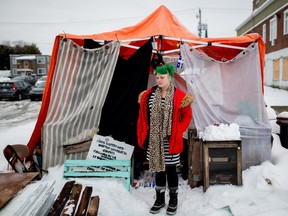When governments build supportive housing in Ottawa, funding 24-hour staff and health-care services is as vital as food, a bed and a roof.
Published Mar 05, 2024 • Last updated 1 hour ago • 3 minute read
 Eloe (no last name given) is shown outside her tent in Gatineau in January. Women account for 27 per cent of the overall homeless population. Photo by Spencer Colby /Postmedia
Eloe (no last name given) is shown outside her tent in Gatineau in January. Women account for 27 per cent of the overall homeless population. Photo by Spencer Colby /Postmedia
International Women’s Day is March 8, and the United Nations hashtag this year is #InvestInWomen. When we invest in women, let’s invest in the women in our city who need it the most.
Picture a homeless person. Most of us will picture a single, older male asking for money. Did you know that in Canada, women account for 27 per cent of the overall homeless population?
Advertisement 2
This advertisement has not loaded yet, but your article continues below.
THIS CONTENT IS RESERVED FOR SUBSCRIBERS ONLY
Subscribe now to read the latest news in your city and across Canada.
Exclusive articles from Elizabeth Payne, David Pugliese, Andrew Duffy, Bruce Deachman and others. Plus, food reviews and event listings in the weekly newsletter, Ottawa, Out of Office.Unlimited online access to Ottawa Citizen and 15 news sites with one account.Ottawa Citizen ePaper, an electronic replica of the print edition to view on any device, share and comment on.Daily puzzles, including the New York Times Crossword.Support local journalism.
SUBSCRIBE TO UNLOCK MORE ARTICLES
Subscribe now to read the latest news in your city and across Canada.
Exclusive articles from Elizabeth Payne, David Pugliese, Andrew Duffy, Bruce Deachman and others. Plus, food reviews and event listings in the weekly newsletter, Ottawa, Out of Office.Unlimited online access to Ottawa Citizen and 15 news sites with one account.Ottawa Citizen ePaper, an electronic replica of the print edition to view on any device, share and comment on.Daily puzzles, including the New York Times Crossword.Support local journalism.
REGISTER / SIGN IN TO UNLOCK MORE ARTICLES
Create an account or sign in to continue with your reading experience.
Access articles from across Canada with one account.Share your thoughts and join the conversation in the comments.Enjoy additional articles per month.Get email updates from your favourite authors.
Sign In or Create an Account
or
Article content
Article content
This number is most certainly undercounted. Women’s homelessness is often invisible. Women and gender-diverse people are more likely than men to couch-surf, trade sex for housing, or live in overcrowded apartments.
At Cornerstone Housing for Women, we know this because in 2023 we provided shelter to more than 325 women and gender-diverse people — a small fraction of the homeless population in Ottawa — but we still had to divert more than 400 people to other locations because our shelter was full each night.
I have worked on the front lines and in management positions for gender-based social service agencies for more than 30 years. These past four years have been the most difficult for our front-line staff, our nurses and especially for women and non-binary people experiencing the crisis of homelessness.
For example, we have had to administer naloxone to counter drug overdoses four times as often as we did pre-pandemic. Where someone used to require only one or two doses of the life-saving drug, they now require six, seven, or maybe eight doses to revive them. Since the pandemic, rates of substance-use disorders, mental illness and violence across all of our programs and housing residences have risen dramatically. To put it plainly: residents are simply more unwell than they were pre-pandemic.
Advertisement 3
This advertisement has not loaded yet, but your article continues below.
Article content
Health-care services have become more essential than ever to the operation of our shelter and supportive housing residences.
We work with Ottawa Inner City Health to provide physical and mental health-care support at one of our supportive housing residences and our emergency shelter. Cornerstone has also hired a clinical chaplain who supports women with spiritual healing and counselling, but we need so much more to meet the growing demand.
It’s not enough to just invest in capital funding. When governments build supportive housing in Ottawa, funding for 24-hour staffing and health-care services is just as essential as food, bedding and a roof over one’s head. It’s the only way to end chronic homelessness and stop people from ending up back on the streets.
Our front-line staff are graduates with social worker degrees or diplomas. They are not trained as nurses or health-care professionals. Since the pandemic, front-line staff have had to step outside their trained field to save lives. Mental unwellness and substance use across all programs and housing residences have risen dramatically.
Advertisement 4
This advertisement has not loaded yet, but your article continues below.
Article content
Cornerstone Housing for Women is set to open its fifth supportive housing residence in April. Without additional provincial and federal funding for health-care support through Ottawa Inner City Health, we are concerned many of the residents won’t get the care they need. We need all levels of government to come together and provide much-needed health-care support for our city’s most vulnerable women.
This International Women’s Day, March 8, is an important day to remember that investing in ending women’s homelessness is not just a catchy hashtag. Homelessness directly impacts women and gender-diverse people’s quality of life. If we don’t invest in women’s care, their future is a life on the streets, or potentially and unfortunately, something worse.
Martine Dore is Director of Programs and Services at Cornerstone Housing for Women in Ottawa.
Recommended from Editorial

Tent City Nation: Mapping stories of homeless encampments across Canada

In London, shelters are stop-gap solutions says this Tent City Nation reader
Article content
>>> Read full article>>>
Copyright for syndicated content belongs to the linked Source : OttawaCitizen – https://ottawacitizen.com/opinion/columnists/dore-womens-homelessness-is-often-invisible-but-its-a-crisis-we-must-solve










